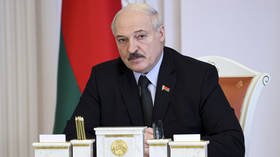Belarus reveals when its new constitution will take effect

Minsk’s revised constitution will take effect in mid-March, Belarusian President Alexander Lukashenko has revealed, following a nationwide vote on the proposed changes. However, critics have warned that the amendments pave the way for the long-term leader to maintain his grip on power.
In a statement on Friday, the former Soviet Republic’s veteran leader hailed the outcome of the referendum held on 27 February. According to the election commission, 65% of Belarusians who cast their ballots were in favor of the revisions.
“This event will go down in the textbooks as another milestone in the development of a sovereign country,” Lukashenko proclaimed, adding that “it is very symbolic that the amended constitution will enter into force on March 15 – Constitution Day.” The mid-March holiday is celebrated annually to mark the approval of Minsk’s fundamental laws on the date in question in 1994.
Under the new constitution, the leader of Belarus will be able to serve only two five-year terms. This change applies solely to “newly elected presidents,” however, opening an avenue for Lukashenko to govern for another decade, if he decides to run again after his current term finishes in 2025. Former presidents will also be granted the perk of becoming life-long senators and immunity from prosecution for all actions undertaken while in office.
Additional amendments will see the role of the so-called All-Belarusian People’s Assembly strengthened, transforming it into the nation’s highest representative body. It currently functions as a general government summit at which senior officials and industry leaders meet every five years. However, under the changes, it will have the power to impeach the president and appoint members of the Supreme and Constitutional Courts, as well as the Central Electoral Commission.
The assembly will also be able to set the basis of domestic and foreign policy, military doctrine, and national security. In the wake of the proposed changes, Western-backed opposition figure Svetlana Tikhanovskaya claimed Lukashenko would be able to “secure power [and] control the situation through the artificial All-Belarusian People’s Assembly.”
Minsk’s strongman, who has ruled since 1994, told officials in September that his government would set out the revisions “so that we cannot be accused of clinging to power until our hands turn blue … and fiddling with this constitution for our own benefit.”
However, the West has already said it will not recognize the results of the referendum, and the EU has previously condemned the election of August 2020, which saw tens of thousands of people take to the streets to demand a fresh vote after Belarus’ embattled leader declared a landslide victory.
Brussels described the presidential race as neither free nor fair, and refused to acknowledge its legitimacy. The bloc later imposed sanctions on individuals “identified as responsible for repression and intimidation against peaceful demonstrators, opposition members and journalists … as well as for the misconduct of the electoral process.”














